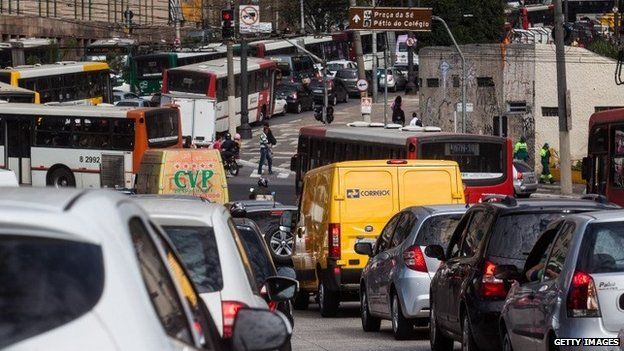Brazil World Cup: Sao Paulo metro strike to continue
- Published

Metro workers in Brazil's largest city, Sao Paulo, have voted to remain on strike for an indefinite period despite an earlier ruling by a labour court calling on them to return to work.
The court said that the unions had abused their powers.
The governor of Sao Paulo state Geraldo Alckmin said he would dismiss employees who did not come to work on Monday.
With most metro stations closed since Thursday, Sao Paulo has experienced horrendous traffic jams.
The dispute comes as the city prepares to host the opening match of the World Cup on Thursday
Metro workers are demanding a pay rise of 12.2%; the state-owned company has offered 8.7%.
The court in Sao Paulo said that the metro company had acted "in good faith".
It also ruled that the workers broke strike rules by not providing a minimum level of service.
At least 70% of trains should have been running during the day, and 100% during the morning and evening rush hours.
It ruled that the metro unions will have to pay 100,000 reais per day ($45,000; £25,000) for the first four days of strike and 500,000 reais ($220,000; £130,000) per day from Monday.
A few hours later, the unions held a ballot and decided to carry on with the strike.
The two unions negotiating with the company say that the strike will be called off if their demand is met.
"It is not our intention to continue the strike into the World Cup. Our intention is to solve the problem. But that should be the government's aim too," the president of the metro workers' union, Altino Prazeres, told O Globo newspaper.
Analysis
Katy Watson, BBC News, Sao Paulo
The feeling among union members on Sunday afternoon was one of anger and frustration. Anyone who even voiced the idea of abandoning the strike was booed by the huge crowd that had gathered at the union's headquarters.
Most of the speeches were about the wage demands, but the World Cup also came up for discussion.
Union members wore tabards with the words "Transporte padrao FIFA" written on them - a sarcastic reference to the transport system being "Fifa standard".
It is clear there is a great deal of bitterness about the money spent on the tournament.
The metro workers put their identity cards in the air to vote, shouting "We won't give in", and they say they will picket on Monday morning outside one of the metro stations to continue their fight.
Brazil will play Croatia in the newly-built Itaquerao stadium, or Arena Corinthians.
The stadium is in the outskirts of Sao Paulo and access to the venue without public transport will be a huge challenge for fans and those working on the match.
With a population of roughly 20 million people and poor public transport, Greater Sao Paulo is used to traffic congestion.
But the traffic chaos seen on Thursday and Friday was unusual even by the city's standards.
There were more than 200km (125 miles) of traffic jams across the city in the morning rush hour.
- Published7 June 2014
- Published5 June 2014
- Published5 June 2014
- Published4 June 2014